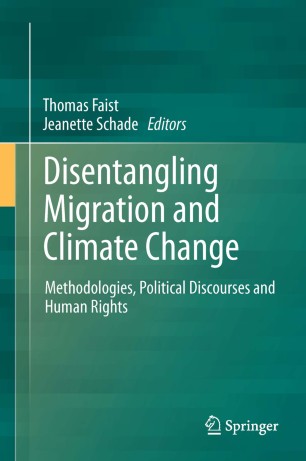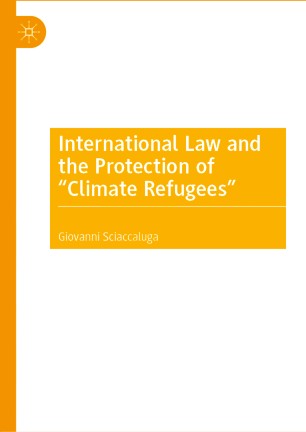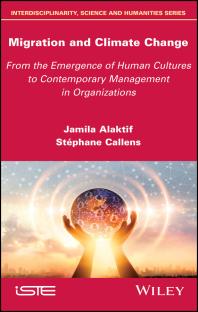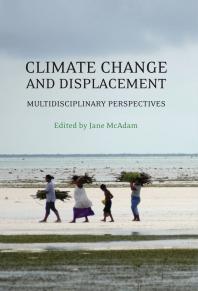Books are excellent sources to consult for general introductory information when you are just learning about a topic or looking for definitions. Remember that books take a long time to be published so their information can be out of date versus other sources such as reports or websites. The UFV Library has numerous print and electronic books available for users to read whether you are at home or on site - please see a small selection highlighted below. If you are unsure how to find books on your own, please see the Library's how-to videos at the bottom of this page or contact a library staff member for assistance.
Finding Books in the UFV Library
Limiting Your Library Search to Streaming Videos

Offers fresh methodological perspectives on the inter-relationship between climate change and migration. Presents up-to-date analysis of the "climate migrant" discourse. Focuses on planned relocation as a policy response to environmentally induced forced migration.

Considers a crucial issue within international law and global politics: climate change and climate-related migration. Provides the academic and policy community with a better understanding of climate-related migration.

Drawing upon the sciences, social sciences and humanities to debate these ethical, cultural, legal, social, economic, technological and political roadblocks, Contemporary Debates on Climate Change is essential reading for all students of climate change, as well as those studying environmental policy and politics and sustainable development more broadly.

Drawing on field research, it argues that extreme weather events such as floods, droughts, cyclones, cloudbursts as well as sea-level rise, desertification and declining crop productivity have shown higher frequency in recent times and have depleted bio-physical diversity and the capacity of the ecosystem to provide food and livelihood security. The volume shows how the socio-economically poor are worst affected in these circumstances and resort to migration to survive.
To understand the systemic reasons for displacement, Ahuja argues, it is necessary to reframe climate disaster as interlinked with the history of capitalism and the global politics of race, wherein racist presumptions about agrarian underdevelopment and Indigenous knowledge mask how financial, development, migration, and climate adaptation policies reproduce growing inequalities.
The book analyzes how changes in rainfall patterns, floods, droughts, heatwaves and landslides affect those who are directly dependent on the agrarian economy. It examines the socio-economic pressures, including the increase in women's work burdens both in production and reproduction on gender relations.
This book brings together research on various aspects of environmental migration in the context of international law, with a particular focus on the emergence and development of regulation in the field of environmental migration at the global and regional levels.

This book addresses this issue, first by identifying precisely where the gap exists, by reviewing the relevant legal tools that are available for those who are currently, and who will in the future be displaced because of climate change.

The first part focuses on climate change and the substantial effects it had on the first human cultures. The second part explores the role of organizations and the development of new frameworks for action in more recent times of anthropogenic climate change.

'Climate Refugees': Beyond the Legal Impasse? addresses a fundamental gap in academic literature and policy making – namely the legal ‘no-man’s land’ in which the issue of climate refugees currently resides.
In the course of the twenty-first century, climate change is projected to significantly increase the already weighty immigration pressures that rich countries in Europe and North America face... Immigration Control in a Warming World aims to address these concerns and discusses potential future solutions to the issue of climate migration

Drawing together experts in this field, Climate Change, Migration and Human Rights offers a fresh perspective on human rights law and policy issues in the climate change regime by examining the interrelationships between various aspects of human rights, climate change and migration.

This book brings together a variety of disciplinary perspectives on the phenomenon of climate-induced displacement. With chapters by leading scholars in their field, it collects in one place a rigorous, holistic analysis of the phenomenon, which can better inform academic understanding and policy development alike.
In Storming the Wall, Todd Miller travels around the world to connect the dots between climate-ravaged communities, the corporations cashing in on border militarization, and emerging movements for environmental justice and sustainability. Reporting from the flashpoints of climate clashes, and from likely sites of futures battles, Miller chronicles a growing system of militarized divisions between the rich and the poor, the environmentally secure and the environmentally exposed.

This book examines whether a global consensus is emerging on climate change and human mobility and presents evidence of a slow-moving but dynamic, step-by-step process of international policy development on climate-related mobility.
This detailed account is a vital step in understanding the links between global discourses on human mobilities, climate change and specific policy responses.
This book examines emerging patterns of human mobility in relation to climate change, drawing on a multidisciplinary approach including anthropology and geography. It addresses both larger, general questions and concrete local cases, where the link between climate change and human mobility is manifest and demands attention - empirically, analytically and conceptually.
In Rising Tides, John R. Wennersten and Denise Robbins face the difficult questions that will have to be answered: How will people be relocated and settled? Is it possible to offer environmental refugees temporary or permanent asylum? Will these refugees have any collective rights in the new areas they inhabit? And lastly, who will pay the costs of all the affected countries during the process of resettlement?
© , University of the Fraser Valley, 33844 King Road, Abbotsford, B.C., Canada V2S 7M8

